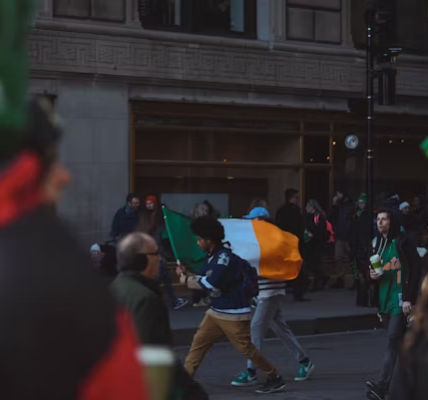Who Celebrates Hanukkah: Hanukkah, also known as the Festival of Lights, is one of the most widely celebrated Jewish holidays around the world. It carries profound historical and religious significance, marking the rededication of the Second Temple in Jerusalem and the miracle of the oil that lasted eight days. While Hanukkah is celebrated by Jews worldwide, the ways in which it is observed and the meanings attached to it can vary based on geographical location, family customs, and personal beliefs. In this article, we explore who celebrates Hanukkah, the significance of the festival, its customs, and how its celebration has evolved over time.

The Origins of Hanukkah
To understand who celebrates Hanukkah, it is essential to first examine its origins. Hanukkah commemorates the victory of the Maccabees, a Jewish group that overthrew the Seleucid Empire’s king, Antiochus IV, who had outlawed Judaism. After the victory, the Jewish people reclaimed the desecrated Second Temple in Jerusalem and rededicated it to the worship of the one true God. According to tradition, when they went to light the temple’s menorah, there was only enough oil for one day, but miraculously, the oil burned for eight days, long enough for them to prepare more.
Hanukkah, which means “dedication” in Hebrew, is celebrated over eight days, starting on the 25th of Kislev in the Jewish calendar, which usually falls in late November or December. The holiday is rooted in Jewish history, and it is observed by Jewish families all over the world.
Jewish Communities Worldwide
The primary group that celebrates Hanukkah is, of course, the Jewish community. Jews living in countries across the globe – from the United States to Israel, Europe, and beyond – observe this holiday with variations in customs depending on local traditions, culture, and personal practices.
Jews in Israel celebrate Hanukkah as a national holiday, often with public celebrations, menorah lightings, and concerts. It’s a time for Jewish families to come together, reflect on their heritage, and express their pride in their religious identity. In Israel, Hanukkah has gained a distinct cultural dimension, and the holiday is celebrated with both religious and secular elements.
In the United States, Hanukkah has become one of the most well-known Jewish holidays, partly due to its proximity to Christmas. American Jews often celebrate Hanukkah with family gatherings, special meals, and public menorah lightings, especially in cities like New York, where elaborate events are held in public spaces. American Jews may also emphasize the cultural aspects of the holiday, incorporating traditions such as playing dreidel and eating foods fried in oil, like latkes and sufganiyot.
Secular and Cultural Jews
While Hanukkah is a religious holiday, it is also celebrated by secular Jews and those who identify more culturally than religiously. Many secular Jews view Hanukkah as a celebration of Jewish identity and heritage rather than a strictly religious observance. For these individuals, the holiday provides an opportunity to reconnect with their roots, regardless of their level of religious observance.
For secular Jews, Hanukkah might be an occasion for family gatherings and community events, but without the religious rituals or prayers typically associated with the holiday. Some may participate in the traditions of lighting the menorah or giving gifts, while others may opt for a more secular approach, focusing on the historical story of the Maccabees’ victory and the miracle of the oil.
Jewish Families of All Denominations
Hanukkah is celebrated by Jews across all denominations, from Orthodox to Reform, and even in the Conservative movement. However, the observance may differ depending on one’s religious practice.
Orthodox Jews observe Hanukkah in the most traditional way, adhering closely to the religious laws and customs associated with the holiday. This includes lighting the menorah with candles or oil, reciting blessings, and saying the Hallel prayers (special prayers of thanksgiving).
Reform Jews, on the other hand, may observe Hanukkah with a focus on family and community, and the celebration may include both religious and secular aspects. Reform congregations may host communal menorah lightings, sing traditional songs, and offer educational programs about the significance of the holiday.
Conservative Jews maintain a balance between tradition and adaptation, celebrating Hanukkah with prayers and rituals, but also incorporating modern elements into the observance. Many Conservative families will follow the rules about lighting the menorah and attending synagogue services, while also engaging in the more festive activities like eating holiday foods and exchanging gifts.
Jewish Communities in Diaspora
In regions where Jews have historically lived as minorities, such as Europe and South America, Hanukkah celebrations have distinct flavors, influenced by local customs and traditions.
For example, in countries like Argentina, Brazil, and Mexico, Jewish communities celebrate Hanukkah with a fusion of Jewish traditions and local culinary specialties. Latkes might be served alongside empanadas, and the lighting of the menorah is often accompanied by gatherings that include both Jews and non-Jews, creating a sense of broader cultural sharing.
In Summary
In conclusion, Hanukkah is a holiday celebrated by Jews of all backgrounds across the world, with a deep connection to both religious history and cultural identity. While the core practices of lighting the menorah, reciting prayers, and enjoying festive foods are central to the celebration, Hanukkah has taken on different meanings depending on the community and individual. Whether it is a religious observance, a cultural tradition, or a time for family bonding, Hanukkah remains one of the most beloved holidays in the Jewish calendar, celebrated with joy and reverence by Jews everywhere.
By understanding who celebrates Hanukkah and why, we gain a deeper appreciation for the rich diversity of the Jewish experience and the lasting significance of this ancient holiday in the modern world.
FAQs
Who celebrates Hanukkah?
Hanukkah is primarily celebrated by Jews around the world. Jewish communities from various countries, including Israel, the United States, the United Kingdom, and beyond, observe this holiday. Both religious Jews and secular Jews (those who identify culturally with Judaism but are not necessarily religious) participate in Hanukkah celebrations.
The holiday is not exclusive to any specific denomination within Judaism. Orthodox, Conservative, and Reform Jews all celebrate Hanukkah, although the observance may vary slightly based on different interpretations of Jewish law and tradition.
Do non-Jews celebrate Hanukkah?
While Hanukkah is a Jewish holiday, many non-Jews, especially those living in countries where Jewish communities are large (like the United States), might be familiar with the holiday. Some non-Jewish people who have Jewish friends or family may partake in the celebration, attending Hanukkah parties or lighting the menorah, but it’s typically not a religious observance for them.
In recent years, non-Jews interested in Jewish culture and traditions may choose to learn about or celebrate Hanukkah as a way to connect with Jewish communities, particularly in multicultural environments.
What is the significance of Hanukkah?
Hanukkah celebrates the miracle of the oil that lasted eight days in the Second Temple of Jerusalem when the Maccabees reclaimed it from the Seleucid Empire. According to Jewish tradition, a small amount of oil used to light the temple’s menorah lasted much longer than expected, symbolizing divine intervention. Hanukkah is a reminder of religious freedom, the triumph of light over darkness, and the perseverance of Jewish culture and faith.
The festival also honors the victory of the Maccabees over the Seleucid king, Antiochus IV, who had outlawed Jewish practices.
Where is Hanukkah celebrated?
Hanukkah is celebrated globally wherever there are Jewish communities. This includes countries with large Jewish populations such as Israel, the United States, Canada, the United Kingdom, Argentina, and France, as well as smaller Jewish communities in regions such as South Africa, Australia, and Eastern Europe.
In Israel, Hanukkah is a national holiday, and in countries like the U.S., the holiday is widely observed, with Jewish families hosting menorah lightings, feasts, and community events.
Can children celebrate Hanukkah?
Yes, children are an integral part of Hanukkah celebrations. The holiday is particularly enjoyable for children due to traditions like spinning the dreidel, receiving small gifts, and participating in the lighting of the menorah. In many Jewish households, kids also help prepare the special foods or join in with singing Hanukkah songs.
In Israel, schools may organize events for children, teaching them about the historical significance of the holiday through songs, games, and activities.
Is Hanukkah celebrated differently around the world?
Yes, Hanukkah celebrations can vary depending on where Jews live. For example, in Israel, Hanukkah is both a religious and national holiday, with many public menorah lightings and concerts. In Eastern European countries, Hanukkah traditions might include different foods or songs. In the United States, due to the large Jewish population, it’s common for people to incorporate modern customs, like exchanging gifts or public menorah displays in city centers.
These regional variations reflect the diverse cultural practices that have evolved within Jewish communities worldwide.
To read more, click here



